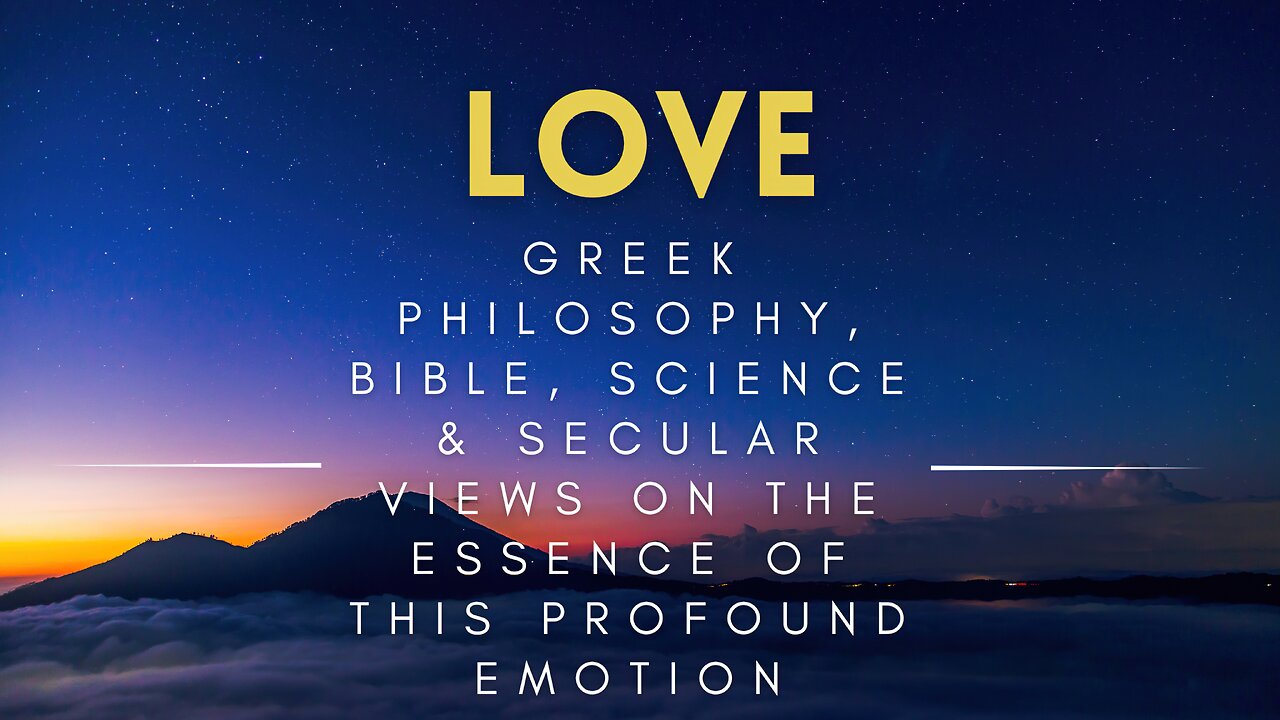Premium Only Content

21 - Love - Greek Philosophy, Bible, Science & Secular Views on the Essence of this Profound Emotion
Dive deep into the multifaceted world of love in this thought-provoking episode. Delving into Greek philosophy, biblical teachings, scientific understanding, and secular views, we explore the essence of this profound emotion. Through the lens of seven types of love in Greek philosophy and bible verses from the book of Proverbs, we attempt to dissect the complex emotion that shapes human relationships and guides our interactions. This episode also highlights the role of love in a life partnership, covering aspects like compassion, kindness, and the willingness to work through hardships.
#love #greekphilosophy #biblicallove #scienceoflove #secularviews #eros #philia #ludus #storge #pragma #philautia #agape #romanticlove #platoniclove #familiallove #selflove #emotionalbonds #relationships #truelove #understandinglove #lifepartner #compassion #kindness #proverbs
References:
Acevedo, B. P., & Aron, A. (2012). Does a long-term relationship kill romantic love? Review of General Psychology, 16(1), 52-59. https://doi.org/10.1037/a0028011
Aristotle. (n.d.). Nicomachean Ethics.
Aron, A., Paris, M., & Aron, E. N. (1995). Falling in love: Prospective studies of self-concept change. Journal of Personality and Social Psychology, 69(6), 1102-1112. https://doi.org/10.1037/0022-3514.69.6.1102
Birnbaum, G. E., & Reis, H. T. (2016). When things fall apart: Gender and breakups in romantic relationships. Current Opinion in Psychology, 13, 143-146. https://doi.org/10.1016/j.copsyc.2016.05.008
Birnbaum, G. E., & Simpson, J. A. (2017). Interpersonal relationships and the self. Current Opinion in Psychology, 13, iii-vii. https://doi.org/10.1016/j.copsyc.2017.08.003
Blaicher, W., Gruber, D., Bieglmayer, C., Blaicher, A. M., Knogler, W., & Huber, J. C. (2000). The role of sex steroids in sexual function. Hormone Research, 54(5-6), 269-276.
Brown, B. (2012). Daring Greatly: How the Courage to Be Vulnerable Transforms the Way We Live, Love, Parent, and Lead. Gotham Books.
Epictetus. (n.d.). Enchiridion.
Fisher, H. E., Aron, A., & Brown, L. L. (2003). Romantic love: A mammalian brain system for mate choice. Philosophical Transactions of the Royal Society of London. Series B: Biological Sciences, 358(1431), 1211-1223.
Fisher, H. E. (2016). Lust, attraction, and attachment in mammalian reproduction. Human Nature, 27(3), 191-208. https://doi.org/10.1007/s12110-016-9266-1
Gottman, J. M. (2015). The Seven Principles for Making Marriage Work. Harmony.
Hatfield, E., & Rapson, R. L. (2013). Passionate love and sexual desire. In R. J. Sternberg & K. Weis (Eds.), The New Psychology of Love (pp. 195-217). Yale University Press.
Harvard Medical School. (2017, February 14). Love, Actually: The science behind lust, attraction, and companionship. Harvard Science in the News. https://sitn.hms.harvard.edu/.../love-actually-science.../
Hendrix, H. (2015). Getting the Love You Want: A Guide for Couples. St. Martin's Griffin.
Johnson, S. M. (2008). Hold Me Tight: Seven Conversations for a Lifetime of Love. Little, Brown Spark.
Langeslag, S. J. E., & van Strien, J. W. (2016). Regulation of romantic love feelings: Preconceptions, strategies, and feasibility. Frontiers in Psychology, 7, 1285. https://doi.org/10.3389/fpsyg.2016.01285
Makhanova, A., & Miller, G. F. (2019). Why do people stay in relationships? The moderating role of conflict resolution styles. Personality and Social Psychology Bulletin, 45(9), 1294-1310. https://doi.org/10.1177/0146167219836113
Meyer, B., & Pilkonis, P. A. (2005). An attachment model of social support and support outcomes. Journal of Personality and Social Psychology, 89(1), 94-108. https://doi.org/10.1037/0022-3514.89.1.94
Murray, S. L., Holmes, J. G., & Griffin, D. W. (1996). The benefits of positive illusions: Idealization and the construction of satisfaction in close relationships. Journal of Personality and Social Psychology, 70(1), 79-98. https://doi.org/10.1037/0022-3514.70.1.79
Perel, E. (2006). Mating in Captivity: Unlocking Erotic Intelligence. Harper.
Pickett, S. M., Gardner, W. L., & Knowles, M. (2004). Getting a cue: The need to belong and enhanced sensitivity to social cues. Personality and Social Psychology Bulletin, 30(9), 1095-1107. https://doi.org/10.1177/0146167204264054
Plato. (n.d.). Symposium.
Uvnas-Moberg, K. (1998). Oxytocin may mediate the benefits of positive social interaction and emotions. Psychoneuroendocrinology, 23(, 819-835.
-
 2:01:55
2:01:55
MG Show
19 hours agoPresident Trump Multilateral Meeting with European Leaders; Trump Outlines Putin Zelenskyy Meeting
17K19 -
 LIVE
LIVE
DoldrumDan
58 minutes agoCHALLENGE RUNNER BOUT DONE WITH ELDEN RING NIGHTREIGN STORY MODE HUGE GAMING
40 watching -
 10:59
10:59
itsSeanDaniel
1 day agoEuropean Leaders INSTANTLY REGRET Disrespecting Trump
7.08K14 -
 16:43
16:43
GritsGG
15 hours agoThey Buffed This AR & It Slaps! Warzone Loadout!
6.95K1 -
 2:05:30
2:05:30
Side Scrollers Podcast
19 hours agoEveryone Hates MrBeast + FBI Spends $140k on Pokemon + All Todays News | Side Scrollers Live
106K11 -
 11:06
11:06
The Pascal Show
13 hours ago $1.06 earned'THEY'RE GETTING DEATH THREATS!' Jake Haro's Lawyer Breaks Silence On Emmanuel Haro's Disappearance!
14K -
 LIVE
LIVE
Lofi Girl
2 years agoSynthwave Radio 🌌 - beats to chill/game to
369 watching -
 2:19:32
2:19:32
Badlands Media
1 day agoDEFCON ZERO Ep. 005: False Flags, Cyber Fronts & Global Power Plays
153K61 -
 2:35:23
2:35:23
FreshandFit
8 hours agoWhy Black Men Don't Date Black Women Debate
43.5K38 -
 2:03:42
2:03:42
Inverted World Live
12 hours agoBigfoot Corpse Coming to the NY State Fair | Ep. 94
111K27